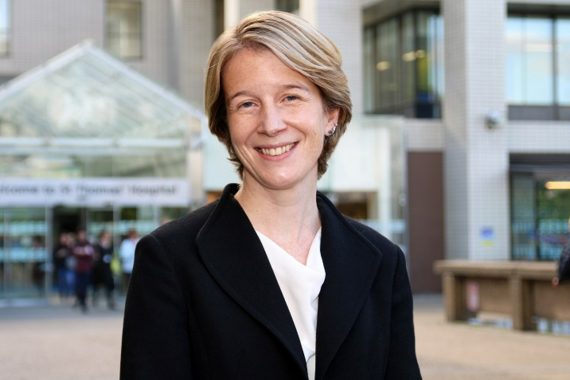Physician associates (PAs) are a ‘small but important’ part of the NHS workforce plan and ‘crucially’ need to be ‘well-supported as colleagues’, NHS England’s chief executive has said.
Speaking at the NHS Confederation Expo in Manchester earlier this week, Amanda Pritchard said that NHS England ‘must work’ with royal colleges and the GMC to ‘ensure’ associate roles are ‘clearly understood’.
She said that the long-term workforce plan is a ‘blueprint for the future’ and stressed that associate roles are an ‘important’ part of it.
The plan, drawn up by NHS England and published in June last year, pledged to increase PA training places in a bid to establish a workforce of over 10,000 PAs by 2036.
It did not specify what proportion will work in general practice but emphasised the need to target more PA roles towards primary care’.
Pulse’s major investigation on the rise of PAs published this week found evidence that practices are in part recruiting PAs instead of GPs, with cost being the driving factor, and also found that in those practices in the lowest decile in terms of payments per patient, around 3.5% of medical staff were physician associates.
Ms Pritchard told the conference: ‘The long-term workforce plan gives us a blueprint for the future. Training thousands more clinicians, doing more to keep the staff we’ve trained and invested in but also reform.
‘More routes into professions, more flexible use of skills, more time for clinicians to do what they do best. I want to be clear, this is a three legged stool: recruit, retain and reform. We can’t pick and choose and decide we only want to do one or two of the three.
‘Associates, for example, a small part of the plan, but an important one. So we must work with clinicians, with royal colleges, with the GMC, to ensure their roles are clearly understood, and that they are well deployed, well supervised, well regulated and crucially well supported as colleagues.’
As of April this year, there were around 1,950 full-time equivalent PAs working across primary care in England, according to NHS Digital, and Pulse has looked at how effective they are and if they reduce GP workload, with some GP partners arguing that ‘heavy’ supervision is ‘the biggest downside’ of the role.
It also looked at what clinical responsibilities they are being given, and the potential risks in their practice, including a lack of guidance and regulations, meaning that GPs are having to decide themselves how to use PAs in general practice.
The workforce plan also committed to ensuring that 130,000 fewer staff leave the NHS over the next 15 years, as well as pledging to double medical school places and increasing GP training places by 50% by 2031.
Yesterday the Labour Party promised to ‘deliver the NHS long-term workforce plan’ in its general election manifesto, among other commitments including a ‘reform’ of primary care, trialling ‘neighbourhood health centres’ which would have GPs and other community health staff ‘under one roof’.
It said: ‘Labour will ensure the publication of regular, independent workforce planning, across health and social care. We will deliver the NHS long-term workforce plan to train the staff we need to get patients seen on time.’
Earlier this year, the public spending watchdog revealed NHS England’s workforce ambitions are based on ‘significant’ substitution of fully-qualified GPs with trainees and SAS doctors.
And a group of influential MPs warned that the ‘unfunded and uncosted’ NHS long term workforce plan risks building on ‘unsustainable’ financial pressures.
















Why? Why should I support some subpar individual with a BTEC? I wouldn’t want a member of my family to be seen by them. Why should I help the government foist these people on patients?
Colleges know what they need to do. The rest of the world tried NHSEs plan and reversed their programmes once they realised the consequences.
What better reason is there now than for the dwindling G.P. workforce to walk out——–will it happen?————never
“A three legged stool”. It’s definitely a stool, albeit of a different type
Well, at least now we have her admission that she considers there to be no difference between a PA and a GP, anyway :-
According to the quote, PAs are only a “small but important” part of the NHS Workforce Plan – exactly the same as how GPs are considered, just “small but important” part too.
when will NHSE realise just how important General Practice really is to keeping the nation’s health service going so far ?
Replace GPs at your peril lady
Physician Associates (PAs) are being labeled as important in the NHS workforce plan, but this shift towards hiring PAs over GPs to cut costs is troubling. PAs lack the extensive training of GPs, which can lead to compromised patient care. Heavy supervision of PAs adds to GPs’ workload rather than reducing it. The focus should be on recruiting and retaining more GPs, who are crucial for delivering high-quality healthcare, rather than settling for less qualified substitutes.
A history graduate the equivalent of PA in the field of health service management.Jees why do our health service leaders cooperate with this Tory clown car.Although I SUSPECT THE RED TORY CLOWN CR WILL BE JUST AS BAD.They are both in the pockets of the Americans.
PAs not to blame, but they are a faulty solution to the problem of underfunding which still needs solving.
BTW, didn’t Pritchard already use her argument last year when she said that Toilet Breaks are a “small but important” part of the NHS workplace plan and “crucially” need to be “well supported by colleagues”??
Methinks she’s got the beginnings of a clever NHS management theory playbook….